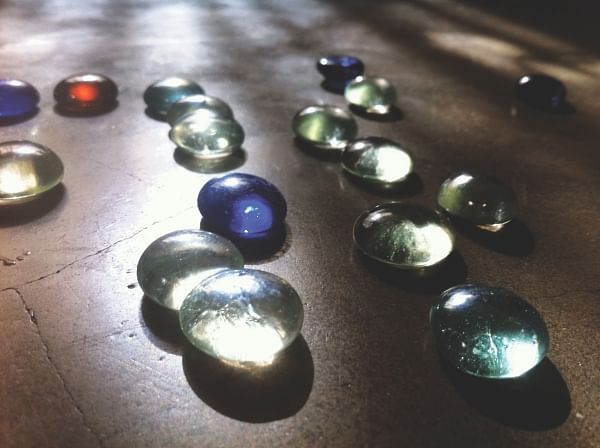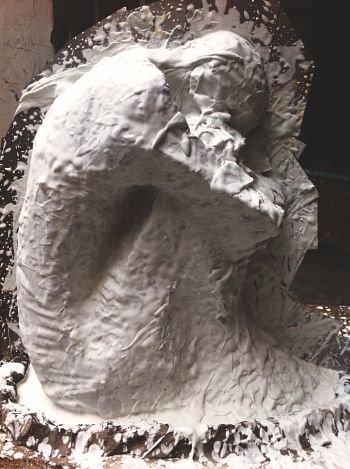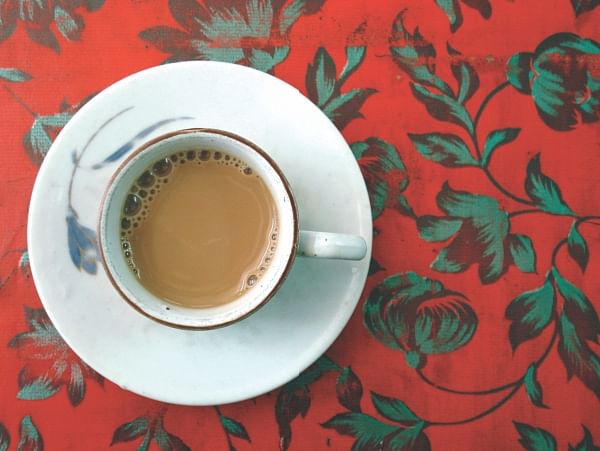| Home - Back Issues - The Team - Contact Us |
 |
| Volume 11 |Issue 32| August 10, 2012 | |
|
|
WANTED Sharbari Ahmed Ella dreams of mutineers after reading a book on the Great Sepoy Mutiny of 1857. Thousands of Indian soldiers, both Hindu and Muslim mutinied when they found out their British masters had issued them cartridges treated with pig and cow lard. The soldiers had to bite off the end of the cartridge to load the bullets into their guns. So, Hindu or Muslim, it was the greatest of insults, the last straw. If the Mutiny was so great, Ella thinks, then why did the British end up staying in India for another hundred years? Why were they not defeated? When Ella is not being acerbic or ironic, her dreams about the Mutiny become terrifying. They activate Ella's buried memories. Ella thinks about this: when the mutineers reach Bengal, they make their way to the former capital of the Raj, Calcutta, and throw people, mostly women and children, into a municipal well and leave them to die slowly. Before the well, they do much, much more. Ella sees the blond headed-blue eyed babies swung by their heels and smashed against the walls of their daddies' bungalows while their ayahs wail into their saris and beg for the lives of “choto Luten sahib” or “choto Isabelle memsahib.” Take their parents but leave the babies, they must have said. The parents are good for nothing, but not the babies. What bothers Ella is that in her dreams the ayahs, the surrogate mothers, do not move towards the killers. They do nothing aggressive to stop them. All the ayahs look like the woman she never knew. Her idea of what her mother must have been. In her dreams, babies are drowned in a well of bodies, maybe even crushed by their mother's weight; arms that had once held them close, pressing against tiny throats until no breath can escape or enter. When Ella wakes up she takes the dream further, imagining terrible scenarios. She sees in detail, a mother who was thrown into the well recognising the anguished cry of her baby deep below her, so deep that the mother thinks for a moment that the cry originates from within her. The mother understands then, terribly, that her weight, is helping to kill her child. The mother tries to lie very still so as not to add to the pressure but beneath her another body writhes in panic and the foot on her neck causes her to lose consciousness. When she wakes she cries out her baby's name. He would answer, the dying woman thinks with what little mind she has left. He just learned to say his own name, was it the day before? But there is no response as her voice is drowned out by the misery of others. The dream starts to visit Ella two days shy of her 40th birthday. It has everything to do with her age but not the impending milestone that is plaguing many of her friends: 40 and childless. She has always known she does not want children. Ella never cries out or even sweats when she dreams. She wakes up with a small start and then looks furtively over to her side to see if she has woken up her lover. He never stirs. 40 is misery, she thinks as she listens to his soft snoring. 40, she has been dreading. Things she avoided dealing with in therapy are starting to catch up.
Ella was born in a small village a day away by train from the capital of Bangladesh, Dhaka, then Dacca, on the border of Assam and Bangladesh, then East Pakistan. She has never returned to that place, nor does she want to, despite the many offers of her doting, adoptive parents, Dottie and Mitchell Fell of Lodi, New Jersey. Upon graduation from high school, she finds a round trip ticket to Dhaka on her canopy bed. And a map of Bangladesh with a small red x marking her “ancestral village” as Dottie calls it. Dottie will go with her, if she wants her to. Ella declines as politely as possible but she is seething inside. All these years, she thinks, and the kid gloves are still on. Instead, she trades in the tickets for ones to Thailand, close to Dhaka but far enough away. There, she eats Thai food for the first time and realises she can stand its heat easily, heat that would have made her father, Mitchell, turn red and have to mop his neck with a napkin. She wonders if her tolerance for spice is genetic, considering she has been raised on meatloaf and tuna casseroles. She liberally sprinkles tiny green chilis soaked in vinegar on to her sticky rice and vows never to go without spice again. She buys cheap t-shirts with fancy logos hastily embroidered on the front: CHANEL, GUCCI, LUIS VUITTON (never mind that's it luggage) for her family and friends, does “shrooms” for the first time and loses her virginity to a student slash musician from Bethlehem (Pennsylvania) who is travelling through Asia to study the various cultures and their music. Hey, where are you from? She cannot even bring herself to utter the word “Bangladesh”. It is not a real place to her. Great. (He says) He is approving enough to hit on her right after this conversation. She wonders vaguely if she will get pregnant. The thought is not distasteful to her. Before she leaves Thailand, she meets another adoptee, a girl abandoned in Harbin, China, who informs her that there are hundreds like them floating around. All kinds of girls, left by the side of the road, in a train station bathroom, in a hospital nursery, under a bridge, down a well. This girl herself was found on the steps of a police station, swaddled in straw with her birth date pinned to her sweater. It's like the cartoon, Harbin girl explains, when the drunken stork drops a mouse baby in with a cat couple. It's crazy and everyone tries to adjust, she tells her, but there's always one who can't hide the fact that, somehow, it doesn't make sense. Usually, it's the daddy. Ella is defensive when the Chinese girl, adopted by Ingrid and Stephan Kinsella of Gottenburg, Sweden, tells her this and refuses to listen. To Ella, she sounds like the Swedish chef on the Muppets. My life makes sense, Ella says to her. Dottie and Mitchell Fell wanted me. In the end, I was wanted. That is what matters. The Harbin Stockholm girl is not trying to be unkind but she points out that at first Ella wasn't wanted and that is what always matters. It's like they say, Ella thinks, you can't travel far enough to get away from what haunts you. It found her, at a roadside food stall in Pattaya, while she was ordering Tum Yum Goong, extra spicy, extra shrimp. Ella asks the Swedish/Chinese girl if she has ever returned to China. The girl wrinkles up her nose. Why would she want to go there? It's too crowded. And hot. And foreign. But she doesn't say this. Instead she says: Dottie smiles at her sadly. Ella knows that when Dottie smiles at her like this she is confused or uncomprehending. Think of it as a sacrifice she made for you. If she hadn't given you up, we wouldn't have found you. Ella knows, like she knew that she would be going to Princeton or that she would never be prom queen, had the woman known it was Ella waiting inside her, abandonment would not have been her first choice. It had been too late for anything else. Dottie keeps trying: Ella rolls her eyes. I don't know what that means. Ella knows the profile well. She took women's studies classes in college. There was even a class on South Asian women specifically. She presented a paper on girl child abandonment as her final project. She did it to prove that she was objective about her lot in life. Like she approaches everything in life, Ella was thorough and specific in her research. So she knows that she must have been one of many children, probably a last attempt to have a boy; a nice strapping specimen to help pick rice and haul it to market. Ella finds that laughable considering she is five foot seven, gigantic for a Bangladeshi woman, and athletic, a field hockey goalie and avid runner. When she is alone, she imagines herself hoisting two baskets laden with harvested rice, one on each shoulder, and walking lightly across the narrow bridges of earth separating the rice paddies—as if she were carrying feathers—while her “brothers,” slighter in build and shorter than her, struggle to lift a single basket. 40 is an age of Knowing Better, she thinks. In places like Bangladesh, 40 is past middle age; not like New York City where 40 is the tail end of a voluntarily prolonged adolescence. Ella looks at the alarm to her left. The power must have gone out during the night because the numbers 12:00 are blinking and she knew it was well past midnight. When she was younger and couldn't get to sleep, she called Dottie. Dottie was never annoyed or reprimanding, no matter the time of night or morning. Ella sometimes felt guilty for breaking into Dottie's slumber, but not too often. She had been told to call whenever she wanted. Ella has no problem accepting unconditional love—she figures she has it coming to her. Dottie would listen to Ella's voice, monotonous from exhaustion, going on about everything that was happening to her, usually mundane details about her day. Never did Ella divulge what was really bothering her. She didn't tell her mother that she was having dreams that made her nervous—this was not the first time a dream was recurring and worrying. Dottie played along and did not ask Ella why she was suffering so much. Until one day when Dottie was too tired to simply listen and not give her opinion. Darling, maybe you need to see someone. Ella re-sets the alarm clock and gets up gingerly, trying not to jiggle the sagging mattress and rousing her lover. She doesn't want to explain to him why she is awake. He will be understanding and sympathetic and Ella will find that stifling. Outside her window she hears people arguing down on the street. She chooses to live in Hell's Kitchen because it was formerly squalid and a neighbourhood that has no illusions about its identity, even though the developers are eying it like it is the new west. She has found a home here. People leave her alone for the most part. There are even Bangladeshis here, installed in a corner convenience store. She met them the first day she moved there. It is a family, a man, a woman and a baby inside her. They conduct their business from behind a metal grating separating them from the customers, but they always have a smile and the occasional free soda for her. The wife asks Ella, in Bengali, where her father is from. When Ella stares at her blankly, the young woman blushes and asks her again, this time in halting English. Ella is relieved and gives the young woman Mitchell Fell's entire genealogy back to an unfortunate indentured servant named Nathan who had died in Valley Forge fighting the British. The young woman catches not even half of it but she smiles at Ella and nods every so often. Ella begins to shop regularly at the Yamuna convenience store, even though the shelves don't offer much by way of convenience items. The husband explains that the Mexican construction workers from down the street regularly rip him off. Usually they are taking beer but sometimes they take toilet paper. She asks the young woman, named Firoza, what Yamuna means. Firoza's smile is puzzled when she tells her that it is the name of a river in Bengal.
Ella is angered by the fact that this couple allow themselves to be victimised. It is frustrating to her to watch them eke out a living. The wife is barely eighteen. Her pregnant stomach is larger than her whole body it seems. Her husband is not much bigger—he comes up to Ella's shoulder. They live above the store. Ella has heard talk that the building is infested with vermin. She stops shopping there and has to walk eight blocks away to buy her cigarettes. Ella puffs on an American Spirit and looks out her window down at the awkwardly painted sign above the doorway of the convenience store. She spots a sliver of blue between the tops of the tenement buildings. Morning has arrived and as usual, she is not ready for it. Hey babe. Tomorrow's the big day. Wait till you see what I've got planned. Great. Every one of her friends bemoans the fact that their significant others don't remember their birthdays and she gets the one guy who has planned for it in advance. Over the organic granola from the Amish Friends Market down the street, Ella tries to convince her lover that she doesn't want a big hoopla for her birthday. He is undeterred and much too chipper. Ella suspects that he has been conversing with Dottie. She knows that Dottie must have told him that turning 40 may be hard for her. Dottie is not a private person and openly shares with anyone who will listen, the story of how they found Ella. Her lover was recounted the entire tale the first day she took him to Lodi. It was not surprising but still, it unnerved Ella. If it had been up to her, she would never have given him every last detail. People were too quick to define her because of it. She has had to explain her life repeatedly, she even wrote her college essay to Princeton about it: Being adopted is not revolutionary. It's not as if I was raised in a cult and never had contact with the outside world. I was raised by a Vietnam vet. And an Avon lady. There was macaroni art on the refrigerator and an above ground pool in the back yard. I fell victim to the gastrointestinal holocaust that most middle class kids suffered through in the 70's—that of the TV dinner and Hamburger Helper. My father built the carport himself and still talks about finishing the basement. In 1976, he put a modular bar and a green, shag carpet in one corner of the half-done basement. My older sister, Melody, saved up enough proof of purchase tabs from Dr. Pepper to get a miniature disco ball in the mail, which she installed immediately over the space next to the bar. Sometimes she let me hang out with her and her friends listening to eight tracks of The Ohio Players. I was in heaven down in the basement, whenever Melody chose to bestow the honour upon me. She bought me my first training bra. The summer my father built the car-port, I was as sick of bicentennial celebrations as everybody else. I mean how many Benjamin Franklins and Martha Washingtons selling used cars can a body take? And I had only been American for two years. What, I ask You, is so extraordinary about my life? Maybe the journey is what gives everyone pause. I understand that, but whose life hasn't been a trip? There was the occasional comment, the odd curious glance that turned into confusion as someone looked at my mom's pale hand protectively clasping my darker one. I know what it looked like. I've seen the pictures over the family room fireplace. There was no doubt that I was a deliberate addition, a charity case. Christian children's Fund Poster Child of 1974. Missionaries wrote letters about my progress to Dottie and Mitchell and signed my name to it. The first picture that was ever taken of me was right after I had my head shaved because I had lice. It was not a flattering photograph. My neck looked too skinny to support my bowling ball of a head. People at “The Little Angels” orphanage posed me in front of a dilapidated storage shed and ordered me to look needy. I was three but I remember it clearly. I played the part to the hilt. I cocked my shorn head to one side to show I was fragile and weary and gave the most pitiful look I could. I want you to want me. Please? Please want me. Within three months I was on a Pan Am jet en route to Lodi, New Jersey, the cultural Mecca of the Northeast, the gateway to all that is avant-garde, the place where press-on nails and hair gel were most likely invented. I would receive a new name—my old one, given to me by Catholic nuns, Khadija, didn't roll off Dottie and Mitchell's tongue as easily as they had hoped. Melody once intimated that actually relatives had remarked that it sounded “Black Panther ish”. This was when hippies and Black Militants were at the height of their power, and the Fells did not fall into either category. The nice thing was, when they could communicate with me, they asked me if it would be okay if they changed my name. They even asked me to pick it. So I had the rare privilege of naming myself. My first choice, Chevrolet, was vetoed by all. One frosty morning, I think I heard the closest thing to an angel I will ever hear, Ella Fitzgerald singing Have Yourself a Merry Little Christmas and I knew what I would be called. It never bothered me that I was tone deaf. At the breakfast table, Ella considers telling her lover that story. Instead, she tells him about the dreams she is having. It is a big step towards intimacy for her and one she regrets almost immediately. He excitedly starts to analyse it, which is precisely what she hoped he would not do: Because you were abandoned. Ella looks up from the granola: Give me a break.
He gets up from the table without finishing his gourmet granola. Suddenly he is not chipper. He has managed, in Ella's estimation, to piss himself off. Or perhaps he was always angry. Before he walks out the door, he tells her that he'll collect her at seven the following evening. Ella goes to kiss him, but he turns his face away. Quit boy m-s-ing, she says, to lighten the mood, and immediately regrets it. You did this, he says. She is left standing in the hallway, staring at closed elevator doors, amazed that she has just participated in a fight that she has no recollection of starting. Is this how men feel most of the time? she wonders. The next day Ella is 40. She is surrounded by her friends, and actually more than one lover if you count the two exes who show up. She looks “smashing” according to everyone except her present boyfriend who is still holding the previous morning's conversation against her. Even though he was the only one having the conversation. Ella, in her own opinion, is not a beautiful woman, but has never wanted for male companionship. She has always had friends and has been romantically involved with someone ever since she was fourteen. She looks around the small area at the back of a narrow bar that Fred reserved for her party. It is cramped and trendy with a great deal of muted lighting and Buddha statues strewn about, which Ella takes as an attempt to simulate Zen intimacy. It is a surprise party. Everyone is well-heeled and seems happy. But Ella knows better. At some time or another, each one of the people celebrating her 40th year, has cried on her shoulder about their miseries. Some legitimate, some not. Ella is considered a great person to pour a heart out to. She never interrupts and so appears to be listening deeply. Really, Ella has nothing to say. She doesn't believe she can help anyone. She believes she is wanting in that regard. My mother Dottie once told me that everyone comes with a well of wisdom. It gets filled up with each new life experience, good and bad. I thought that was corny. It is corny…but it still sucks when your well is empty. At the party a friend says: Ella frowns at her lover. He is unhappy when drunk and prone to hyperbole. Last year, he asked Ella to marry him. She declined for the time being. She loves him but not enough to be married. Fred is an only child and suffers the loneliness that brings—even into adulthood. On their second date, he told Ella that he would never wish that upon any child of his. How many, then? Later that night, Ella, awash in a wide, Mojito sea, dreams of the woman who left her. This time the woman leaves her in a cage at the “Little Angels Orphanage.” It isn't really a cage—just a rusted metal crib with a roof. Ella remembers it well and so sees it well in her mind's eye. The woman has a mournful face but Ella doesn't buy it. She knows that the sadness isn't for her. As the woman shuts the metal roof over her head, Ella feels a snake coiling around her ribcage. It squeezes ever so slightly. In her sleep, as Fred watches her, Ella takes in a sharp breath. Her eyelids start fluttering rapidly. She puts her arms in the air in front of her. Her fingers are curled around the phantom bars of the crib. For a brief moment, she grasps the bars loosely and then sits up. All this is done so lightly that had Fred not been awakened by his pounding head, he wouldn't have known. Ella begins to rock back and forth, holding herself. Fred is not sure if she is awake. He reaches out to her but thinks better of it. This is the first time he has seen Ella like this. The real Ella, he thinks. He shakes his head because this revelation is not voluntary on her part. She will not remember it later. It almost doesn't count, he thinks. After Ella's party, Fred comes home with her to tell her that he is leaving her. He wants to tell her that he is lonelier with her than he was as an only child. She is beautiful and smart and sexy and funny and cold. This combination is too much for him to take. He knows he would rather have homely and a little rotund and affectionate—like his mother. But this Ella, vulnerable, a small girl almost, now rocking from side to side like a pendulum, holding herself; giving warmth to herself, he can take. When Ella opens her eyes, it is to see Fred smiling at her. She groans and hides her head underneath a pillow. Fred is perplexed by her reaction, but still feels hopeful. He pulls her to him, settling himself against her back and cradles her in his arms.
|
||||||||
|



